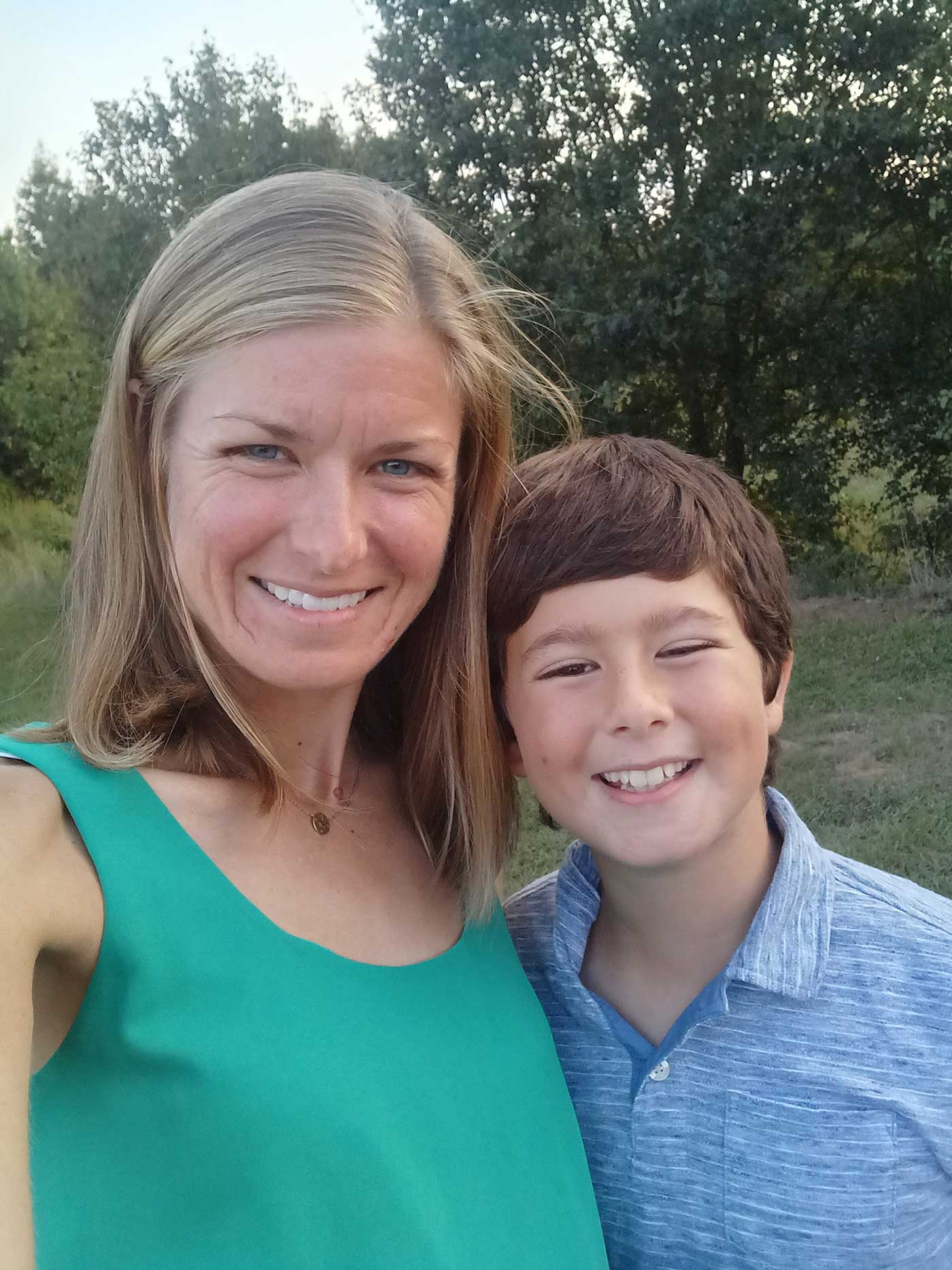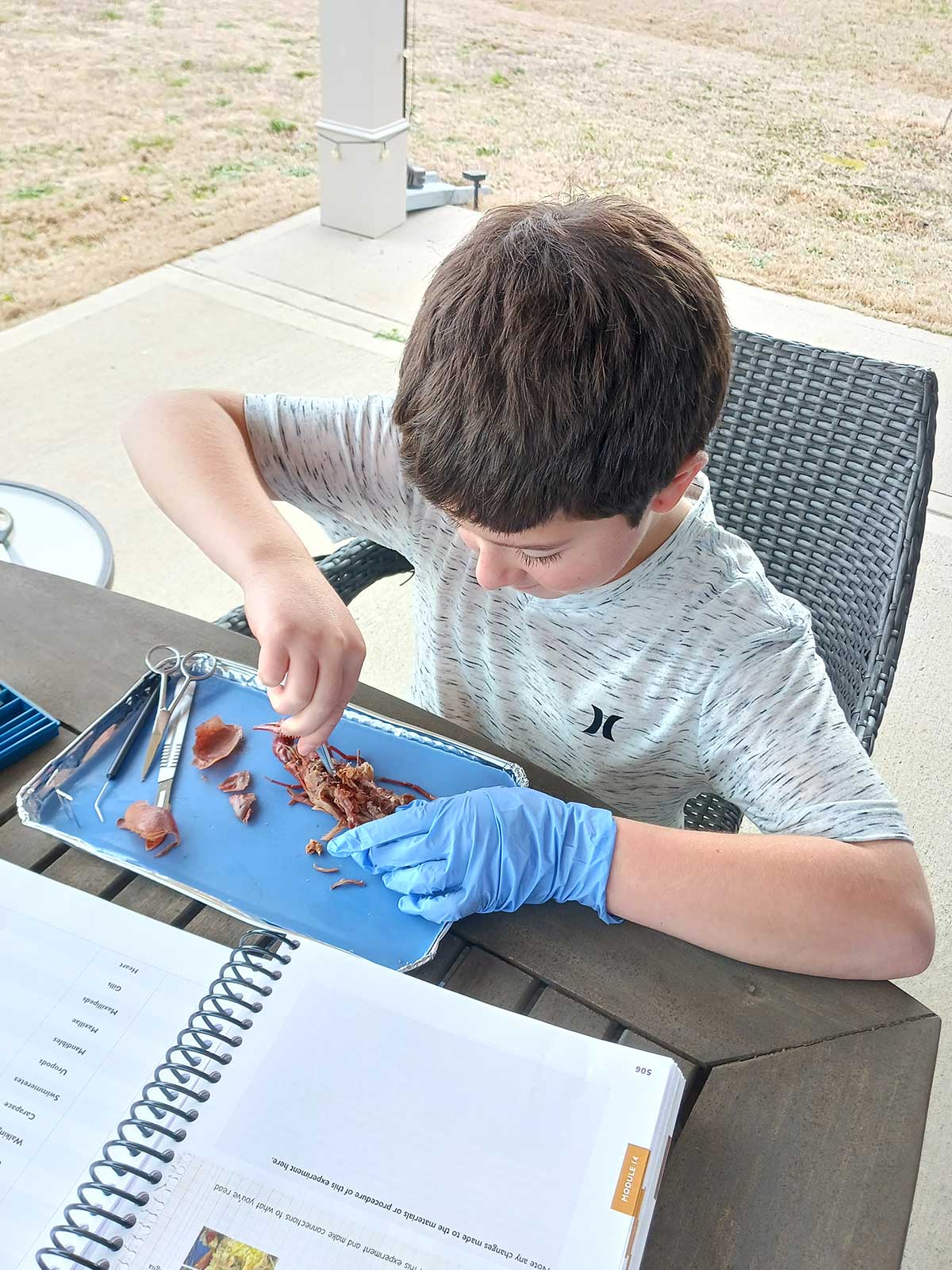When Casey learned she was pregnant with her son, homeschooling was one of the furthest things from her mind. She assumed that once Caden reached school-age, she would enroll him in the public school where she taught.
Once Caden was born, she opted to stay at home, planning to resume her teaching job once he entered kindergarten. But by the time Caden was 2 years old, it was obvious to her that he was profoundly gifted.
“I knew there was something different going on,” she said. “He would want to sit and read book after book. As a teacher, naturally, I might point to some of the words, but he quickly grasped onto the concept that you follow from left to right and go down the page, and then you turn the page.”
Caden was reading and forming words using magnetic letters before he was really talking. And he loved numbers, especially the number 20.
“I never knew another child that loved the number 20 like that,” she laughed.
Seeking Alternatives
Casey quickly realized sending her son to the public school where she worked wasn’t a good idea, and started investigating different options. But most alternatives to public school appeared to involve sitting her son in front of a computer for much of the day. Skipping grades in public school also wasn’t appealing to Casey.
“I knew he wasn't going to be emotionally prepared for that, and I didn't want him to grow up too fast,” she said.
Then Casey considered homeschooling. Growing up in Maryland, she didn’t know any homeschooling families. But as an adult in South Carolina, she had discovered that homeschooling was much more common.

Casey and Caden ready for an orchestra performance
Knowing homeschooling was a valid option (and popular in her area) made Casey feel more comfortable. She felt assured she wouldn't be isolated or ostracized because they homeschooled, so she started homeschooling Caden. Soon they joined a co-op, which she found to be a great fit.
Instead of going back to teaching at the public school and juggling homeschooling at the same time, she worked from home. She eventually secured a job as a financial director for a non-profit in addition to teaching classes online, which she continues to do today.
“The flexibility of these positions has allowed us to make it financially without compromising what is best for Caden and his development,” Casey said.
With Casey able to work with Caden at his advanced tempo at home, she enjoyed watching her son play with his peers at the co-op and get some exposure to a classroom experience. She was also really happy he was getting plenty of age-appropriate social development through the co-op, because she knew that a lot of twice exceptional kids prefer to socialize with adults who are on their intellectual level.
Facing Challenges
When Caden was in second grade, Casey had him tested in order to apply to the Davidson Young Scholars program, an organization that provides community, opportunities, and resources for profoundly gifted children and their families. The test results revealed that Caden was unusually gifted across all academic areas—something rare to see.
This made it challenging to homeschool Caden.
“We have many battles about school,” Casey said. “For one thing, gifted children think they know everything, and so they think they don't need to learn.”
Sometimes Caden would complete his math without showing the work, or just read books without writing any papers. But Casey insisted that he follow through with the hands-on aspect of learning. She wouldn’t just let him do the work in his head.
“The actual work is the hardest thing,” she said.
Finding Support
Through their connection to the Davidson Young Scholarship program, Casey and Caden met a homeschooling family who was starting to set up a new co-op for gifted homeschooled children. Casey excitedly signed Caden up and he soon spent half his co-op day working on a particular project and the second half playing at the park with the other kids.
“Raising a gifted child can be a lonely place,” Casey said. “You can feel isolated and like nobody understands you or your child. So, finding some support, finding other people that can relate or understand is really valuable.”
After the COVID-19 pandemic, Casey hit a financial rough spot and Caden, although only 10, needed advanced high school level curriculum. Purchasing these materials was far beyond her means. But she knew about HSLDA, and after digging around on our website, she learned of HSLDA’s Compassion Grants.
“I’m going to check it out and see if it's possible at all that they could help,” Casey remembered saying to herself. She applied and was thrilled to find she qualified. And she was excited to learn that the grant covered lab material for science classes and much more.

Caden dissecting a crayfish
“It was just such a relief,” she said. “We've been able to do everything this school year with the materials and books and all that we needed.”
Stepping Into the Future
Casey and Caden are still homeschooling. He is now 12 and will be doing work at the 11th and 12th grade levels next fall. Casey continues to seek out other homeschooling families with gifted children for support, which has come largely through the online Davidson program, where Caden has been able to connect with kids like him around the world. For her part, Casey has led discussions for a book club for the kids in the group.
After Caden finishes high school, he’d like to take dual enrollment classes, so he can accrue both college credit and more classroom experience. What does his future look like? According to Caden’s mom, he thoroughly enjoyed the biology and astronomy classes he took this past year, thanks to the HSLDA grant.
“He wants to be some sort of scientist, he says. An immunologist,” Casey said.
Regardless of what Caden eventually chooses to study, his future is bright because of the time Casey has invested in her son. As a public school teacher, it was really difficult for Casey to meet the actual needs of all 25 kids in her class. But as a homeschooling mom of one child, she is able to focus all of her attention on her son and adapt to his needs.
“It's been really cool to see him direct where we're going,” Casey concluded. “Some of the things that he's chosen have just been really exciting, and he's learned some of his passions and different things that he wouldn't get to learn if he was in a classroom.”
Photo credit: All images courtesy of the family.

